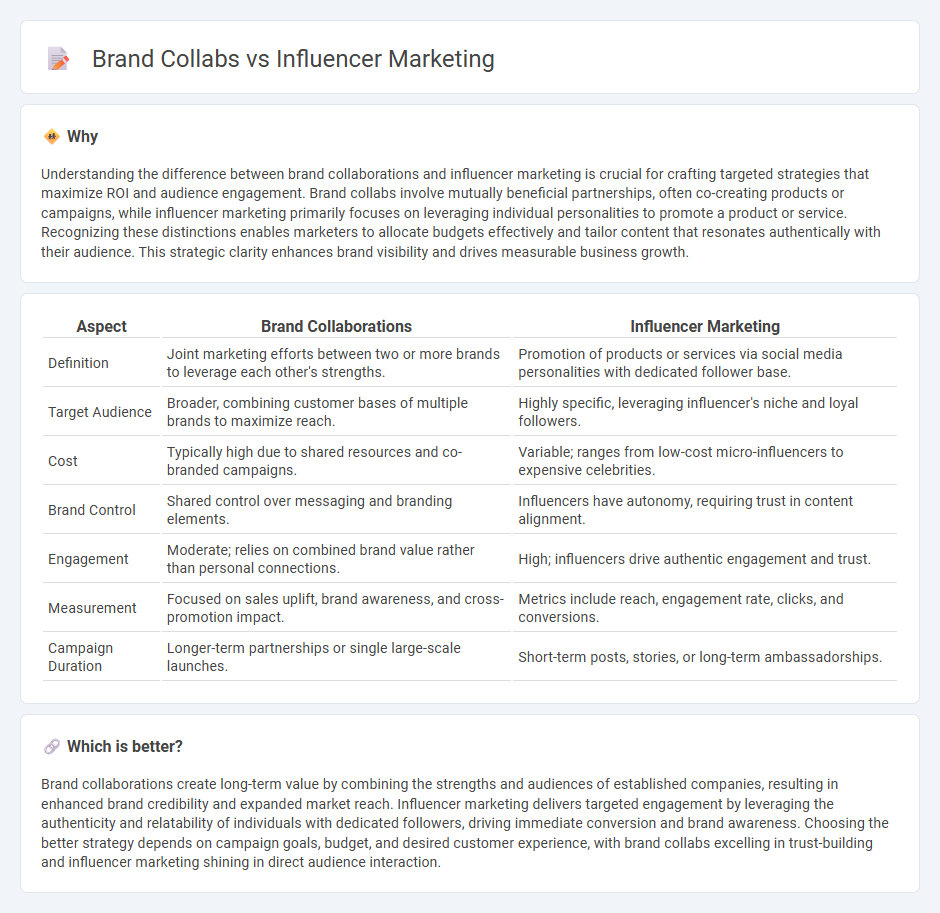
Brand collaborations leverage the combined audience and resources of established companies to create mutually beneficial campaigns, often resulting in enhanced credibility and larger reach. Influencer marketing relies on individuals with dedicated followings to promote products authentically, driving engagement through personal trust and niche targeting. Explore how these strategies compare to optimize your marketing efforts effectively.
Why it is important
Understanding the difference between brand collaborations and influencer marketing is crucial for crafting targeted strategies that maximize ROI and audience engagement. Brand collabs involve mutually beneficial partnerships, often co-creating products or campaigns, while influencer marketing primarily focuses on leveraging individual personalities to promote a product or service. Recognizing these distinctions enables marketers to allocate budgets effectively and tailor content that resonates authentically with their audience. This strategic clarity enhances brand visibility and drives measurable business growth.
Comparison Table
| Aspect | Brand Collaborations | Influencer Marketing |
|---|---|---|
| Definition | Joint marketing efforts between two or more brands to leverage each other's strengths. | Promotion of products or services via social media personalities with dedicated follower base. |
| Target Audience | Broader, combining customer bases of multiple brands to maximize reach. | Highly specific, leveraging influencer's niche and loyal followers. |
| Cost | Typically high due to shared resources and co-branded campaigns. | Variable; ranges from low-cost micro-influencers to expensive celebrities. |
| Brand Control | Shared control over messaging and branding elements. | Influencers have autonomy, requiring trust in content alignment. |
| Engagement | Moderate; relies on combined brand value rather than personal connections. | High; influencers drive authentic engagement and trust. |
| Measurement | Focused on sales uplift, brand awareness, and cross-promotion impact. | Metrics include reach, engagement rate, clicks, and conversions. |
| Campaign Duration | Longer-term partnerships or single large-scale launches. | Short-term posts, stories, or long-term ambassadorships. |
Which is better?
Brand collaborations create long-term value by combining the strengths and audiences of established companies, resulting in enhanced brand credibility and expanded market reach. Influencer marketing delivers targeted engagement by leveraging the authenticity and relatability of individuals with dedicated followers, driving immediate conversion and brand awareness. Choosing the better strategy depends on campaign goals, budget, and desired customer experience, with brand collabs excelling in trust-building and influencer marketing shining in direct audience interaction.
Connection
Brand collaborations and influencer marketing intersect by leveraging influencers' authentic connections with target audiences to amplify brand messaging. Collaborative campaigns integrate influencer creativity with brand identity, enhancing engagement and driving conversions. This synergy boosts brand visibility and fosters trust through relatable content tailored to consumer preferences.
Key Terms
Influencer Marketing:
Influencer marketing leverages social media personalities with dedicated followings to promote products, driving authentic engagement and higher conversion rates compared to traditional advertising. Brands utilize detailed audience analytics and content alignment to ensure influencer partnerships resonate and maximize ROI. Explore how tailored influencer marketing strategies can elevate your brand's visibility and customer trust.
Sponsored Content
Sponsored content in influencer marketing leverages authentic creator endorsements to enhance brand credibility and engagement, driving higher ROI compared to traditional advertising channels. Brand collaborations often involve co-created content that aligns with both the influencer's audience and brand identity, boosting organic reach and consumer trust. Explore detailed strategies and case studies to maximize the impact of sponsored content in your marketing campaigns.
Audience Engagement
Influencer marketing leverages individual creators with dedicated followings to generate authentic audience engagement, often resulting in higher trust and interaction rates. Brand collaborations, however, merge brand identities to create campaigns that can simultaneously target multiple market segments while enhancing reach and credibility. Explore how these strategies differ in boosting audience engagement and driving brand loyalty.
Source and External Links
Influencer marketing - Influencer marketing is a form of social media marketing involving endorsements and product placement from individuals with expert knowledge or social influence on platforms like Instagram, YouTube, and TikTok, aimed at shaping consumer behavior through credible content.
What Is Influencer Marketing? - Influencer marketing involves partnering with individuals who have a following to increase brand exposure, with a strategic approach including setting measurable goals, understanding the audience, and budgeting for influencer fees and content creation.
All You Need to Know to Plan, Execute, and Generate ROI - Influencer marketing expands brand reach and credibility by collaborating with professional influencers, requiring careful campaign planning and platform-specific strategies to maximize return on investment.
 dowidth.com
dowidth.com